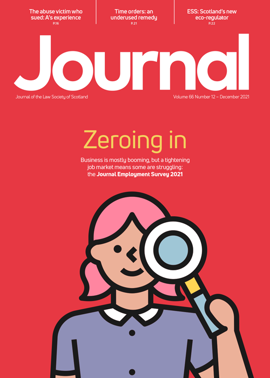The earlier the better
Lockton, the appointed broker responsible for placing and managing the Master Policy, has received a number of queries from solicitors about how to intimate claims and circumstances. The following is a repost of an article at Journal, September 2012, 40 which is essentially still valid and is revised and updated here for convenience.
Given the tens of thousands of transactions undertaken by Scottish solicitors annually, it is reassuring that, even in today’s challenging environment, there are comparatively few claims made against the profession. However, it is important to have an understanding of the claims notification process, including what and when to intimate.
What do I have to intimate to the Master Policy, and when?
 In terms of the Policy, there is a requirement to advise the brokers “as soon as reasonably practical after becoming aware of circumstances which might reasonably be expected to produce a claim irrespective of the insured’s views as to the validity of the claim or on receiving information of a claim”.
In terms of the Policy, there is a requirement to advise the brokers “as soon as reasonably practical after becoming aware of circumstances which might reasonably be expected to produce a claim irrespective of the insured’s views as to the validity of the claim or on receiving information of a claim”.
Essentially, that means that to provide full protection to the firm, any claim or circumstance in which the firm might require the benefit of indemnity under the policy – regardless of the firm’s opinion on liability and regardless of the self-insured amount – should be promptly notified. Notification will be taken as a formal request for indemnity under the Master Policy, with the result that all the various terms and conditions will apply.
How should claims/circumstances be intimated? Is there any claim form I should use?
Intimations should be made to the brokers, Lockton, by letter or email. There is no claim form, and no particular prescribed manner of intimation, but insurers will need sight of any letter of claim, together with the firm’s views on liability and quantum, if possible. It can be very helpful to set out some background to the situation, or to the transaction giving rise to the claim, in a memorandum by either the fee earner concerned or someone who has reviewed the file.
If no claim has been intimated – i.e. if the matter is being intimated as “circumstances which might give rise to a claim” – then it is helpful again to set out the background, provide some comments on liability and quantum, and explain why you consider that a claim might be made against the firm.
If a potential claim is without foundation, and I am satisfied that it can be resolved without insurer involvement, do I need to intimate it?
Even if the matter is not as yet a claim, it is still advisable to intimate the circumstances as soon as possible. “Circumstances” (as opposed to claims) do not impact a practice’s premium at all. Moreover, circumstances and claims only remain on the firm’s record for premium rating purposes for five insurance years. If a circumstance were to develop into a claim three years after it was initially intimated, for example, it will only impact the firm’s premium for the two following insurance years. There is therefore a clear benefit in intimating early.
What if a claim is clearly within the self-insured amount? Can we deal with the claim ourselves?
Where a claim clearly falls within the level of any self-insured amount applying, it is likely that insurers will agree that the firm can deal with the matter. In those circumstances, the insurers will still be happy to provide guidance or approve a draft letter of response if asked to do so by the firm.
Should quantum escalate and the claim exceeds the self-insured amount, the firm is protected by having intimated the matter and having sought advice from insurers. There can be no danger of any issue of late notification, which could otherwise affect policy cover.
It is also helpful to remember to advise the outcome of any matter handled directly by the firm, as any payment made will count towards the application of the aggregate annual self-insured amount.
Can we instruct our own solicitors?
The Master Policy provides that in addition to damages and claimants’ costs, insurers will pay “all other costs and expenses incurred with their written consent”.
Costs incurred without the written consent of the insurers are not therefore covered. In practice, this means that the insurers will not generally meet the fees and outlays of solicitors instructed directly by the insured firm, including under any legal defence union arrangements.
Insurers work with a panel of experienced solicitors with an excellent record in handling professional negligence claims. Having developed strong relationships with the firms and the individuals involved, insurers can negotiate the best rates available, limiting the costs incurred on the individual claim and across the Master Policy.
Insurers also require panel solicitors to operate within an established framework of audit, quality control and limitation of costs.
Can I choose who is instructed?
Where the particular context of a claim – for example because of the subject matter, or because proceedings have been served or are imminent – means that it is necessary to instruct panel solicitors to represent the firm, insurers will discuss the appointment with you.
Does the firm need to have a claims partner?
It is helpful generally to have one individual within a firm who is assigned responsibility for Master Policy matters. Not only does that ease communication when a claim arises, but it also tends to avoid intimation of new matters from falling between two or more partners’ responsibilities.
Why do the insurers allocate a reserve, and how is that calculated?
In common with all other insurance arrangements, the Master Policy insurers are required to make adequate provision for any claim in respect of which indemnity is likely to be provided. It is also necessary for the lead insurers to provide information to co-insurers to enable them to make their own provision.
Reserves are calculated on the basis of “known probable cost”, being neither the best nor the worst-case scenario, but a realistic assessment. Insurers assess the likely final cost of any claim against the information provided, using the benefit of many years of experience in the field.
Reserves must reflect:
- the extent to which a duty of care and liability exists at law between the insured firm and the claimant;
- whether any losses are referable to any civil liability;
- the impact of any relevant case law;
- whether the claimant has contributed to the loss;
- whether any other parties have contributed to the loss;
- whether the insured practice has a right to recover from a third party;
- likely or anticipated legal costs;
- any applicable self-insured amount.
- Reserves are continually reviewed during the lifetime of a claim to ensure that they are adequate to meet any obligation on the insurer without at any stage being excessive.
Any query regarding the possible effect of a reserve on the firm’s future premiums should be referred to the broker, Lockton.
I have a request here for one of our closed files. No claim has been intimated to date. What should I do?
Insurers defer to the Law Society of Scotland’s advice on this point, but clearly, where a client mandate is received from another firm of solicitors, this will require to be obtempered unless any lien applies in respect of unpaid fees. Even where a mandate applies, intra-office memoranda and a fee earner’s preparatory notes are not covered, so there is no requirement for these to be released. Detailed guidance on ownership and release of client files is available on the Society’s website.
If, however, the file is requested on behalf of someone other than your client, or on behalf of only one client when you were acting for two (e.g. lender and borrower), careful consideration will have to be given to the ownership of the respective parts of the file and to any issues of confidentiality arising.
It is sensible always to retain a copy of whatever papers are released in response to a mandate or other request.
Should a formal claim be made against the firm, and particularly should any action be raised, specific guidance will be provided by insurers and panel solicitors. It will be appreciated that the file could in any case be obtained by the pursuer under a specification of documents.
I am retired but have been contacted by a former client who intends to make a claim for legal work I carried out on their behalf. Will I be covered by the Master Policy?
The Master Policy will respond to historic claims at the point in time when they are made, insofar as they have not prescribed or already been the subject of a successful claim. Where you were the employee or principal of a firm which is still in operation, the claim should be sent to that firm who will intimate it to Lockton. Likewise, where the firm has been sold to another firm which has assumed responsibility for the historic claims record, the claim should be sent to that successor firm.
Where the firm in which you were an employee or principal is no longer in business, it is likely that the Master Policy’s “run-off” provisions will apply. Run-off applies when a practice ceases trading and there is no successor practice to take on responsibility for claims arising from historic work. The Master Policy continues to provide cover in respect of claims already intimated as well as any claims that are intimated after the closure of the practice, insofar as they are related to matters dealt with by the firm prior to its closing. Run-off cover continues indefinitely as long as the Master Policy arrangement remains in force.
The limit of indemnity provided in run-off will be whatever the mandatory limit of indemnity is under the Master Policy at the time the claim is made. The self-insured amount will be the same as that applying to the firm at the time the policy goes into run-off.
Regulars
Perspectives
Features
Briefings
- Criminal court: OLRS – life means life
- Corporate: Will a deal impact on national security?
- Intellectual property: IP and AI – the latest
- Agriculture: Securing successor crofting tenant status
- Succession: Back of an envelope – testamentary intent?
- Scottish Solicitors' Discipline Tribunal
- Data protection: Google off the hook
- Property: Beautifully presented tedium
- In-house: Lawyers in uniform
In practice
- Your Law Society of Scotland Council members
- Legal services regulation reform – have your say
- The Word of Gold: Whither goest thou?
- Coaching: help in a fast changing world
- The earlier the better
- Family mediation accreditation: a view from the panel
- The Eternal Optimist: Just to say thanks…
- Appreciation: Albert Vincent Sheehan
- Ask Ash: A broken work circle







